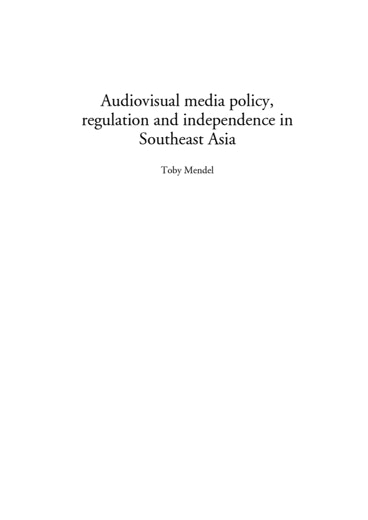The media systems of Southeast Asia are extraordinarily diverse in terms of professional standards, economic models, political engagement, and technology. They range from Vietnam, where private media are not allowed, to Thailand, where all broadcasters are somehow public in character, to Indonesia and the Philippines, with their vibrant and commercialized broadcast sectors.
Yet these countries also have much in common; there is a regional identity, with many shared experiences and interests.
In this new report, media law analyst Toby Mendel surveys audiovisual media policy and regulation in ten countries of Southeast Asia, assessing them in terms of the degree and quality of independence that they have proven capable of supporting. He concludes that "lack of real political will has stymied audiovisual media reform in all countries in the region since 2000."
He continues: "The way forward is not in doubt: independent regulators need to be given the power to regulate broadcasting under clear public interest rules, with analogous needs for public broadcasters, namely independence and clear public interest mandates. And freedom of the internet should simply be respected." However, Mendel adds, the strategy for achieving these reforms is far from clear.
Mendel’s overview offers an essential tool for everyone concerned with the situation and prospects of media in this strategically significant region. A partner report—on news media production and consumption across Southeast Asia—is also available.
Read more
Ukraine’s Independent Media
Q&A: Telling War Stories Under Fire

It is incredibly tough to cover war against an enemy who wields disinformation amid the bombs and bullets. Yet thousands of displaced Ukrainian journalists carry on. What it takes to keep their stories coming.
Documentary Films
Q&A: Harnessing the Power of Documentary Storytelling

Orwa Nyrabia, artistic director of the International Documentary Film Festival Amsterdam, talks to Open Society about his experiences in Syria as a child and during the war, and its impact on his worldview and creative path
Strength in Numbers
Q&A: How Collaborative Journalism Defeats Censorship

Responding to increasingly violent attacks on reporters all over the world, the organization Forbidden Stories brings journalists together to amplify the stories that enemies of a free press want to keep hidden.
